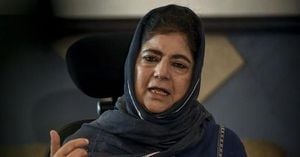CBS News is currently caught in the middle of political tensions and legal scrutiny over its editing of a "60 Minutes" interview with Vice President Kamala Harris, which aired on October 7, 2024. Following a letter of inquiry from the Federal Communications Commission (FCC), CBS is providing the requested unedited transcripts and camera feeds of the interview.
The FCC, led by Trump appointee Brendan Carr, is reviewing the complaint against CBS, initially lodged by Donald Trump, who has accused the network of manipulating the interview to mislead voters and bolster Harris’ campaign during the election season. Trump’s lawsuit alleges at least $10 billion in damages, claiming the editorial choices made by CBS were not only deceptive but also tainted the political process.
"Late Wednesday, CBS News was sent a Letter of Inquiry from the Federal Communications Commission asking for the full, unedited transcript and camera feeds from our interview with Vice President Harris..." CBS stated on January 31, 2025. The network has expressed its intent to comply, declaring it is legally obliged to do so.
Historically, the edits made during the broadcast are common practice within the television news industry. CBS justified its actions, emphasizing the necessity of adhering to time constraints during the live airing. The differences between the segments aired on "60 Minutes" and the promotional clips shown on "Face the Nation" led Trump and his allies to claim foul play. CBS countered these allegations by stating, "The lawsuit Trump has brought... is completely without merit," downplaying the significance of the edits.
Trump’s lawsuit not only claims defamation but also stipulates violations of Texas’ Deceptive Trade Practices Act (DTPA). This legislation is intended to protect consumers from misleading actions when engaging in trade or services. Experts argue, though, the legal basis for Trump’s claims is tenuous at best, as CBS’s journalistic decisions typically fall outside the scope of the DTPA.
Following the submission of the inquiry, Anna Gomez, one of the Democratic FCC commissioners, voiced her concerns about the motives behind the FCC's actions. "The Communications Act clearly prohibits the Commission from censoring broadcasters and the First Amendment protects journalistic decisions against government intimidation," Gomez stated. Her remarks illuminate the apprehension held by many about political motives impacting independent regulatory actions.
Speculation surrounding the potential for CBS to reach a settlement with Trump has been fueled by the looming merger between CBS's parent company, Paramount Global, and Skydance Media. Reports emerged indicating Paramount might be pushing for a resolution to ease potential regulatory hurdles related to their merger, which is worth billions to Shari Redstone, the company's controlling shareholder. Paramount's willingness to entertain settlement discussions casts doubt on the fortitude of CBS’s earlier claims, as their corporate parent weighs financial advantages against journalistic integrity.
With internal friction brewing, CBS news staff have expressed discontent at the possibility of capitulating to Trump’s demands. One anonymous correspondent from CBS noted, "We’re helpless to whatever Shari and the bosses decide to do. But it’s a real shame to think the news division is a bargaining chip in this broader deal." This sentiment reflects the tricky balance between maintaining journalistic standards and satisfying corporate interests.
The FCC remains embroiled in this contentious situation, historically tasked with overseeing broadcast media to adhere to principles of truthfulness and integrity. Yet the agency’s recent inquiries have drawn scrutiny from those who fear it may be acting on behalf of presidential whims, especially under the influence of Carr, who has echoed many of Trump’s complaints about perceived media bias.
Despite the legal fragility of Trump's case, the influence exerted through his lawsuit raises questions about the expectations placed on news organizations to operate independently. The chilling nature of this situation portrays how media can become entangled within the sphere of political actions and lawsuits when they deviate from preferred narratives.
Negotiations between CBS and Trump highlight the extraordinary pressures faced by media companies, illustrating the complex interaction between journalistic integrity and corporate maneuvering amid political realities. The outcome of this situation could set notable precedents on how media companies handle litigation from powerful political figures and could significantly alter perceptions of press freedom moving forward.



